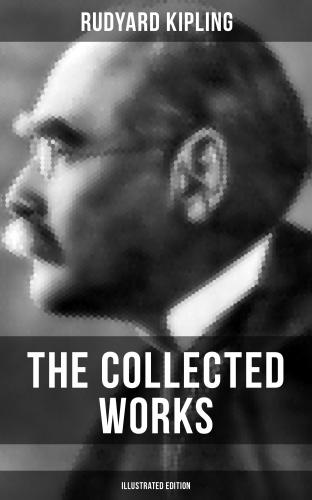'Allah Karim! Oh, well that the Babu was by! Wast thou very wet?'
'Why should I regard? I remember the hakim was concerned for the body of Teshoo Lama. He haled it out of the holy water in his hands, and there came afterwards thy horse-seller from the North with a cot and men, and they put the body on the cot and bore it up to the Sahiba's house.'
'What said the Sahiba?'
'I was meditating in that body, and did not hear. So thus the Search is ended. For the merit that I have acquired, the River of the Arrow is here. It broke forth at our feet, as I have said. I have found it. Son of my Soul, I have wrenched my Soul back from the Threshold of Freedom to free thee from all sin—as I am free, and sinless. Just is the Wheel! Certain is our deliverance. Come!'
He crossed his hands on his lap and smiled, as a man may who has won Salvation for himself and his beloved.
The End
The Naulahka: A Story of West and East
I
There was a strife 'twixt man and maid--
Oh that was at the birth o' time!
But what befell 'twixt man and maid,
Oh that's beyond the grip o' rhyme.
'Twas: 'Sweet, I must not bide wi' you,'
And: 'Love, I canna bide alone';
For baith were young, and baith were true,
And baith were hard as the nether stone.
—Auchinleck's Ride.
Nicholas Tarvin sat in the moonlight on the unrailed bridge that crossed the irrigating ditch above Topaz, dangling his feet over the stream. A brown, sad-eyed little woman sat beside him, staring quietly at the moon. She was tanned with the tan of the girl who does not mind wind and rain and sun, and her eyes were sad with the settled melancholy of eyes that know big mountains, and seas of plain, and care, and life. The women of the West shade such eyes under their hands at sunset in their cabin-doors, scanning those hills or those grassless, treeless plains for the homecoming of their men. A hard life is always hardest for the woman.
Kate Sheriff had lived with her face to the West and with her smouldering eyes fixed upon the wilderness since she could walk. She had advanced into the wilderness with the railroad. Until she had gone away to school, she had never lived where the railroad ran both ways. She had often stayed long enough at the end of a section with her family to see the first glimmering streaks of the raw dawn of civilisation, usually helped out by the electric light; but in the new and still newer lands to which her father's civil engineering orders called them from year to year there were not even arc lamps. There was a saloon under a tent, and there was the section-house, where they lived, and where her mother had sometimes taken to board the men employed by her husband. But it was not these influences alone that had produced the young woman of twenty-three who sat near Tarvin, and who had just told him gently that she liked him, but that she had a duty elsewhere.
This duty, as she conceived it, was, briefly, to spend her life in the East in the effort to better the condition of the women of India. It had come to her as an inspiration and a command two years before, toward the end of her second year at the St. Louis school, where she went to tie up the loose ends of the education she had given herself in lonely camps.
Kate's mission had been laid on her one April afternoon, warmed and sunned with the first breath of spring. The green trees, the swelling buds, and the sunlight outside had tempted her from the prospect of a lecture on India by a Hindu woman; and it was finally because it was a school duty not to be escaped that she listened to Pundita Ramabai's account of the sad case of her sisters at home. It was a heart-breaking story, and the girls, making the offerings begged of them in strange accents, went from it stilled and awed to the measure of their natures, and talked it over in the corridors in whispers, until a nervous giggle broke the tension, and they began chattering again.
Kate made her way from the hall with the fixed, inward-looking eye, the flaming cheek, and airborne limbs of one on whom the mantle
